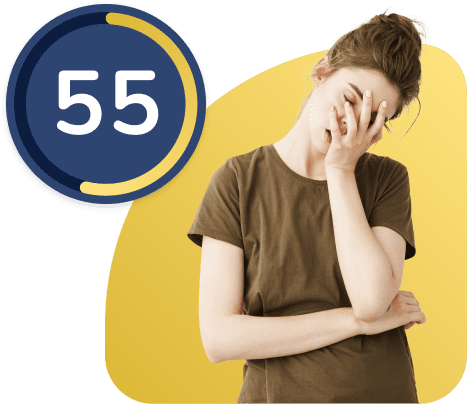The months following childbirth, commonly referred to as the postpartum period, are filled with many changes as a person adjusts to no longer being pregnant. Insomnia is a common symptom during this transition. It often begins during pregnancy and can continue postpartum due to a variety of factors.
In addition to physical changes during the postpartum period, the responsibilities of being a new parent can often be overwhelming. This can cause additional disruptions to a person’s sleep. People experiencing postpartum insomnia may benefit from learning more about the causes of insomnia and steps they can take to improve their sleep.
Symptoms of Postpartum Insomnia
The symptoms of insomnia can vary from person to person. People may have difficulty falling asleep or staying asleep throughout the night. Others arise too early in the morning and have trouble falling back asleep. And some people with insomnia may find they wake up feeling unrested or like they got poor quality sleep.
Insomnia also affects how a person functions throughout the day. Daytime symptoms of insomnia can include:
- Worsened mood or irritability
- Lack of focus or concentration
- Feelings of tiredness and sleepiness
- Lack of energy or motivation
- Less desire to socialize
- More errors or accidents
It is common for new parents and caregivers to wake up repeatedly at night to feed and care for a newborn. For this reason, many caregivers experience sleep deprivation when caring for a newborn.
Some people can fall back asleep and stay asleep in between these interruptions. Other people may have more difficulty sleeping during these periods and may be exhibiting symptoms of postpartum insomnia.
The sleep deprivation that can happen during the postpartum period is different from postpartum insomnia. Sleep deprivation occurs when a person does not have enough time to sleep or their sleep is interrupted. Insomnia occurs when a person cannot sleep despite having time and opportunities to rest.
What Causes Postpartum Insomnia?
During the postpartum period, a number of psychological and physical changes can disrupt sleeping patterns and lead to insomnia.
- Stress: While being a new parent can be an exciting and joyful time, the responsibilities that arise following childbirth may also be overwhelming. The stress that accompanies these new responsibilities can often make it more difficult for caregivers to sleep.
- Anxiety: Some people may have anxiety following childbirth that contributes to insomnia. Anxiety during this time period may be caused by various factors, including worries around a newborn’s health.
- Increased Sleep Disruptions: Childcare and nighttime feedings can interrupt a person’s sleep. These interruptions may contribute to sleep deprivation that, over time, can lead to the development of insomnia.
- Discomfort: Following childbirth, a person may also feel a lot of discomfort that makes it more difficult for them to fall or stay asleep. Physical symptoms differ from person to person and may include pelvic pain, breast tenderness, and difficult or uncontrollable urination.
Postpartum Depression
Some people experience depressive symptoms after giving birth. While the exact cause of this is still being studied, researchers suspect that these symptoms may be triggered by hormonal changes occuring in the body.
When symptoms are mild, this is known as the postpartum or baby blues. However, when symptoms are persistent or severe, a person may be diagnosed with postpartum depression. People concerned about postpartum depression should talk with their doctor or their baby’s pediatrician for support.
Research has established a close link between insomnia and depression. Studies have shown that insomnia that lasts over a long period of time can contribute to depression. Conversely, insomnia is a common symptom of both postpartum blues and depression.
Tips for Preventing and Managing Postpartum Insomnia
The effects of not getting enough sleep can be challenging, especially while acclimating to the changes that come with being a new parent. However, there are some strategies that may help some people prevent and manage their postpartum insomnia.
- Get Physical Activity: Physical activity during the day, even if this consists of a brisk walk outside, can help combat symptoms of insomnia. Engaging in physical activity has shown to be safe and healthy after childbirth. However, it is important not to exercise too close to bedtime, since this can actually make it harder to sleep.
- Try Relaxation Activities: Relaxation activities before bed, such as deep breathing, meditation, or yoga, can help reduce feelings of stress and anxiety. This may help individuals who can’t sleep because of worries related to their newborn and parenthood.
- Share Responsibilities: Find a way to share the responsibilities of caring for a newborn to help reduce sleep interruptions and sleep deprivation. This may also ease worries around having to wake up and check on the newborn throughout the night, allowing more time for restful sleep.
- Improve Sleep Hygiene: Sleep hygiene refers to the habits that can contribute to sleep quality. Learning about and adopting healthy sleep habits, like limiting caffeine and electronics in bed, may also help to improve sleep quality.
- Find Time to Nap and Sleep: During the postpartum period, it can be helpful to schedule naps when the baby sleeps, even during the day.
- Optimize the Sleep Environment: It can be helpful to have a bedroom or other sleep environment that supports quality sleep. Making sure the room is dark, cool, and quiet with minimal noise may help caregivers sleep more soundly.
While these strategies may help, the changes that come with being a new parent can make it difficult to maintain consistent sleep habits. People who are struggling to improve symptoms of insomnia using at-home strategies should talk to a health care or mental health professional about medications, talk therapy, and other forms of support, such as a new parent group.
Cognitive behavioral therapy (CBT) is one type of talk therapy that may be recommended to address postpartum insomnia. When addressing insomnia, this type of therapy incorporates educational guidance to help people adopt good sleep habits in a structured and personalized way. Studies also suggest bassinets designed to promote sleep in infants and reduce sleep disruptions for new mothers can be effective.
References
The Sleep Doctor Forum: Real Experiences, Real Connections
Continue the discussion on the Sleep Doctor Forum. Connect with experts and fellow forum members on CPAP, sleep apnea, and all things sleep. A priceless resource that’s free to join.


































